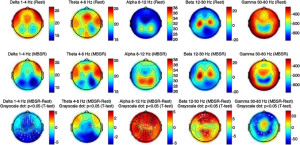By John M. de Castro, Ph.D.
“It is fascinating to see the brain’s plasticity and that, by practicing meditation, we can play an active role in changing the brain and can increase our well-being and quality of life.” – Sarah Lazar
The mind and body are intrinsically intertwined. The old distinction between mind and body has been shown to be a false distinction. The brain, the organ of the mind, also controls the physiology, while the activity of the physiology affects the brain. So, mind and body are interconnected. Hence, mind practices should also affect the physiology just as physiological changes affect the mind.
Contemplative practices have been shown to influence both the mind, brain, and the physiology. Among the many physiological effects of contemplative practices are alterations of the cardiovascular system, producing reductions in heart rate, heart rate variability, and blood pressure. Contemplative practices have also been shown to alter the nervous system changing the size, activity, and connectivity of brain structures. These changes can be measured in many ways, but a convenient and inexpensive non-invasive method to document changes in brain activity is by recording the electrical activity of the nervous system from the scalp, known as the electroencephalograph or EEG. Indeed, the changes in brain activity produced by contemplative practices can be seen in the EEG.
Mindfulness Based Stress Reduction (MBSR) was one of the first contemplative practices to be applied to improving human well-being. It is an amalgam of practices, including meditation, yoga, and body scan. It has been shown to be beneficial for cardiovascular function and to change neural activity. One way to look at the integration of mind-body activity is to measure the relationship between brain activity and cardiovascular activity over time. In today’s Research News article “Entrainment of chaotic activities in brain and heart during MBSR meditation”
Harvard neuroscientist: Meditation not only reduces stress, here’s how it changes your brain
Gao and colleagues investigated the effects of an 8-week Mindfulness Based Stress Reduction (MBSR) training program on the coordination of electrical activity from the nervous system (EEG) with the electrical activity from the heart (Electrocardiogram, ECG). The EEG and ECG were recorded during 10-minutes of mindful breathing both before and after MBSR training.
They measured the chaotic nature of the activity in both the EEG and ECG employing a measure of wavelet entropy. This measure documents the unpredictability and random nature of the signals. They found that after MBSR training there was a reduction in the entropy of both the brain waves, EEG, and the heart electrical activity, ECG. This demonstrates that MBSR training results in reduced variability and randomness of the electrical activities of both the heart and brain. Significantly, they found that the entropy of the EEG and EKG were highly correlated as a result of MBSR training. That is, the lower the entropy of the EEG, the lower the entropy of that ECG. In other words, as the brain activity became less chaotic, so did the activity of the heart. They were coordinated.
One way that Mindfulness Based Stress Reduction (MBSR) training might produce these effects on the level of entropy and its coordination of the heart and brain activities is by its effects on the autonomic nervous system. This system has two roughly opposing systems, the sympathetic and parasympathetic nervous systems. Sympathetic activation tends in activate the heart and brain while parasympathetic activity tends to reduce activation of both. If these two systems oppose one another instead of acting in a coordinated fashion, then greater variability of the EEG and ECG would be expected. MBSR has been shown to reduce the activity of the sympathetic nervous system both centrally and peripherally and increase parasympathetic activity. The current results, then, could well have occurred by MBSR producing better coordination of the balance of sympathetic and parasympathetic activity.
Mindfulness Based Stress Reduction (MBSR) appears to improve the coordination between the mind and body. This is emphasized in the body scan and yoga components of MBSR where attention to sensations from the body is emphasized. It is also emphasized during meditation as a result of learning to attend to the sensations associated with breathing. So, MBSR would seem well suited to increasing the coordination of mind and body. Today’s Research News results support this idea.
So, improve mind-body connection with mindfulness.
“We can intentionally shape the direction of plasticity changes in our brain. By focusing on wholesome thoughts, for example, and directing our intentions in those ways, we can potentially influence the plasticity of our brains and shape them in ways that can be beneficial.” – Richie Davidson
CMCS – Center for Mindfulness and Contemplative Studies
